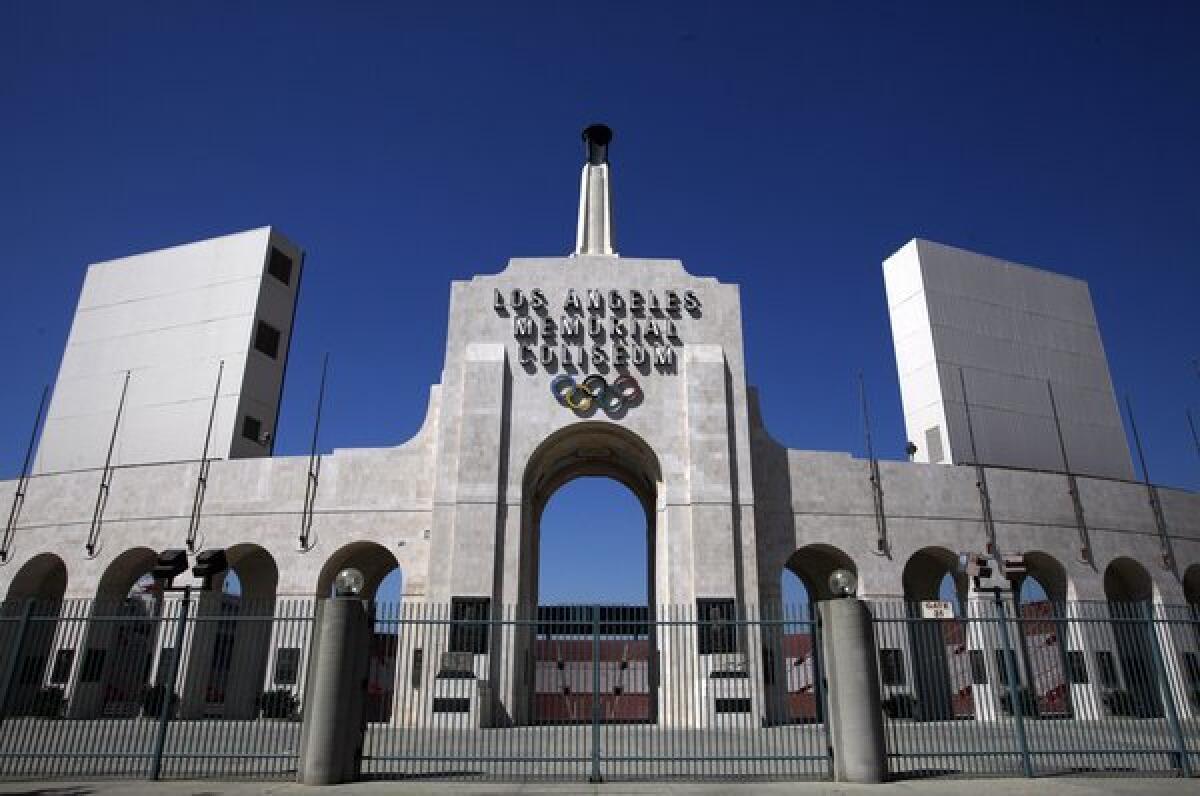California Science Center grants control of Coliseum to USC

- Share via
The California Science Center gave final approval Wednesday to a deal that grants USC control over the publicly owned Los Angeles Memorial Coliseum and nearly all of its revenue for the next century.
With no debate, the lease agreement passed on a voice vote by five of the eight Science Center board members, all appointed by the governor’s office.
Finalizing the arrangement took more than a year longer than the Coliseum’s governing commission had hoped, largely because its secretive handling of the lease deliberations alienated key backers of the Science Center and two other museums that share Exposition Park with the stadium.
The commission approved the lease in May 2012 after months of closed-door talks, with the public and museum officials locked out. Commissioners had signed a confidentiality agreement that USC, a private school, requested early in the negotiations.
“We’ve worked hard to preserve this incredible institution,” Los Angeles County Supervisor Don Knabe, president of the Coliseum Commission, told the Science Center board Wednesday. “It’s a big day for all of us.”
Marvin Holen, a member of the Science Center’s fundraising foundation board, disagreed, saying the lease shortchanges taxpayers.
“It is a reflection of extraordinarily poor governance,” Holen said. “It’s inappropriate to turn over public property in the nature of Exposition Park, the Coliseum, Sports Arena and other such facilities to a private party for their own financial gain.”
The Science Center loses control of its parking lots to USC up to 10 times a year, depending on the football calendar.
USC took over Coliseum operations in July. But Wednesday’s vote capped a turbulent period for the 90-year-old venue, a publicly owned landmark that ran into controversy in 2010, when a 15-year-old girl died from an Ecstasy overdose after attending a rave there.
Eight months later, a scandal erupted after The Times reported that a Coliseum events manager took money from the rave company while he oversaw its concerts, including responsibility for measures to prevent drug abuse and provide emergency medical care.
Subsequent reports by The Times revealed a wide range of financial irregularities at the Coliseum and a pattern of poor oversight by the commissioners who ran it.
The disclosures led to criminal indictments of three former Coliseum managers, two rave promoters and a stadium contractor. They also resulted in last year’s decision by the commission to turn over stewardship of the Coliseum to USC, whose football team is the stadium’s main tenant.
The lease package, which also turns over the Sports Arena to USC, commits the university to spending up to $100 million on improvements in the Coliseum. It will pay the state $1 million in annual rent, which rises to $1.3 million in 2016 and afterward will be adjusted for inflation.
USC retains all ticket and concession revenues from football games and other Coliseum and Sports Arena events — and as much as 95% of the naming rights and advertising proceeds from the properties, which initially could sell for a combined $4 million to $6 million a year, according to sports economists.
The school must pay the state 5% of the naming rights receipts from the Coliseum. If it shows a profit on overall stadium operations, USC would pay escalating shares to the government, starting with 5% of the first $2.5 million in net gains.
Experts have been skeptical that USC would report a profit, saying that most colleges with football programs instead use their earnings to make their stadiums nicer for fans, advertisers, players and coaches.
The university also has the option to develop a soccer stadium at the Sports Arena site. Under the terms of the lease, the public would not share in any new revenue from such an enterprise.
More to Read
Sign up for Essential California
The most important California stories and recommendations in your inbox every morning.
You may occasionally receive promotional content from the Los Angeles Times.












